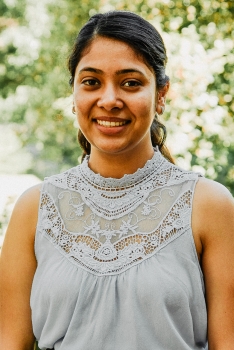 For her research that could help paper and packaging manufacturers advance their sustainability efforts, graduate student Udita Ringania was one of three international winners of the 2021 Blue Sky Young Researchers and Innovation Award.
For her research that could help paper and packaging manufacturers advance their sustainability efforts, graduate student Udita Ringania was one of three international winners of the 2021 Blue Sky Young Researchers and Innovation Award.
Ringania, a third-year PhD student in Georgia Tech’s School of Chemical and Biomolecular Engineering (ChBE), was recognized for her project titled “Dewatering of Cellulose Nanomaterials Using Ultrasound.”
Presented every two years, the Blue Sky award is sponsored by the International Council of Forest and Paper Associations (ICFPA), a worldwide network of forest and paper associations. The theme for the 2020-2021 award program was “Boosting the Forest Bioeconomy: Nature-Based Solutions Toward a Lower Carbon Economy.”
Ringania’s Blue Sky-winning project began during her first year at Tech when her advisor, Assistant Professor Saad Bhamla, suggested the idea of applying ultrasound to remove water from cellulose after another research team demonstrated an ultrasonic fabric dryer.
“The idea stemmed from there,” Ringania explains. “We wondered if we develop related technology for the paper industry, which uses a lot of energy in the process of removing water.”
Industrial Use
Ringania, who collaborated with ChBE undergraduate researcher Joseph Harrison on the project, says the ultrasound method would be more sustainable and could be achieved affordably at an industrial scale, because the transducers used in the process can be bought cheaply in bulk.
As she prepares this research for journal submission, Ringania hopes that the Blue Sky recognition will attract corporate interest. “The pulp and paper industry might be very interested in this technology, and then we can start work on scaling it up,” she says.
Ringania, who was also recently selected to receive a sustainability fellowship from Georgia Tech’s Brooks Byers Institute of Sustainability, earned her master’s degree in chemical engineering at Indian Institute of Technology, Kharagpur, before starting at Georgia Tech. She pursued the master’s to explore whether she liked research before entering a PhD program.
Attraction to Tech
Part of what attracted her to Georgia Tech was the presence of Bhamla, whose research she’d followed closely since learning about his commitment to “frugal science,” developing high-performance, low-cost, easy-access engineering solutions. Specifically, she had seen his work on creating paper centrifuges for developing areas, where doctors need them for disease diagnosis.
“I was persistent in e-mailing Bhamla about his research before joining Georgia Tech; I knew I wanted to be part of his lab,” Ringania says.
“The Bhamla lab is curiosity-driven, going wherever our curiosity takes us. We’re trying to solve problems that can have an actual impact in industry and society today.”
Community Bond
Ringania remembers that her first semester at Georgia Tech was challenging, but she says that the camaraderie of her classmates helped make the transition easier. “We created a strong bond among us.”
She became active in the community-building efforts of the Georgia Tech chapter of the Association of Chemical Engineer Graduate Students (AChEGS), serving as the organization’s treasurer in 2019-20.
Ringania, who grew up in Guwahati, India, says she felt shy at first as an international student, concerned that she might not understand colloquial words or references in conversations. “But everyone made me feel so welcome,” she says. “The first semester was not a cultural shock because of the community we have here. You can go talk to professors any time you need to.”
Ringania, who married her husband (Vaibhav Gupta) in March 2021, hasn’t decided what career path to pursue after earning her PhD. Initially she was sure she wanted to become a professor, but she has also grown interested in corporate opportunities.
“Right now, I’m leaving my options open,” she says. “I haven’t experienced corporate life yet, so an internship might be helpful.”
Brad Dixon, braddixon@gatech.edu